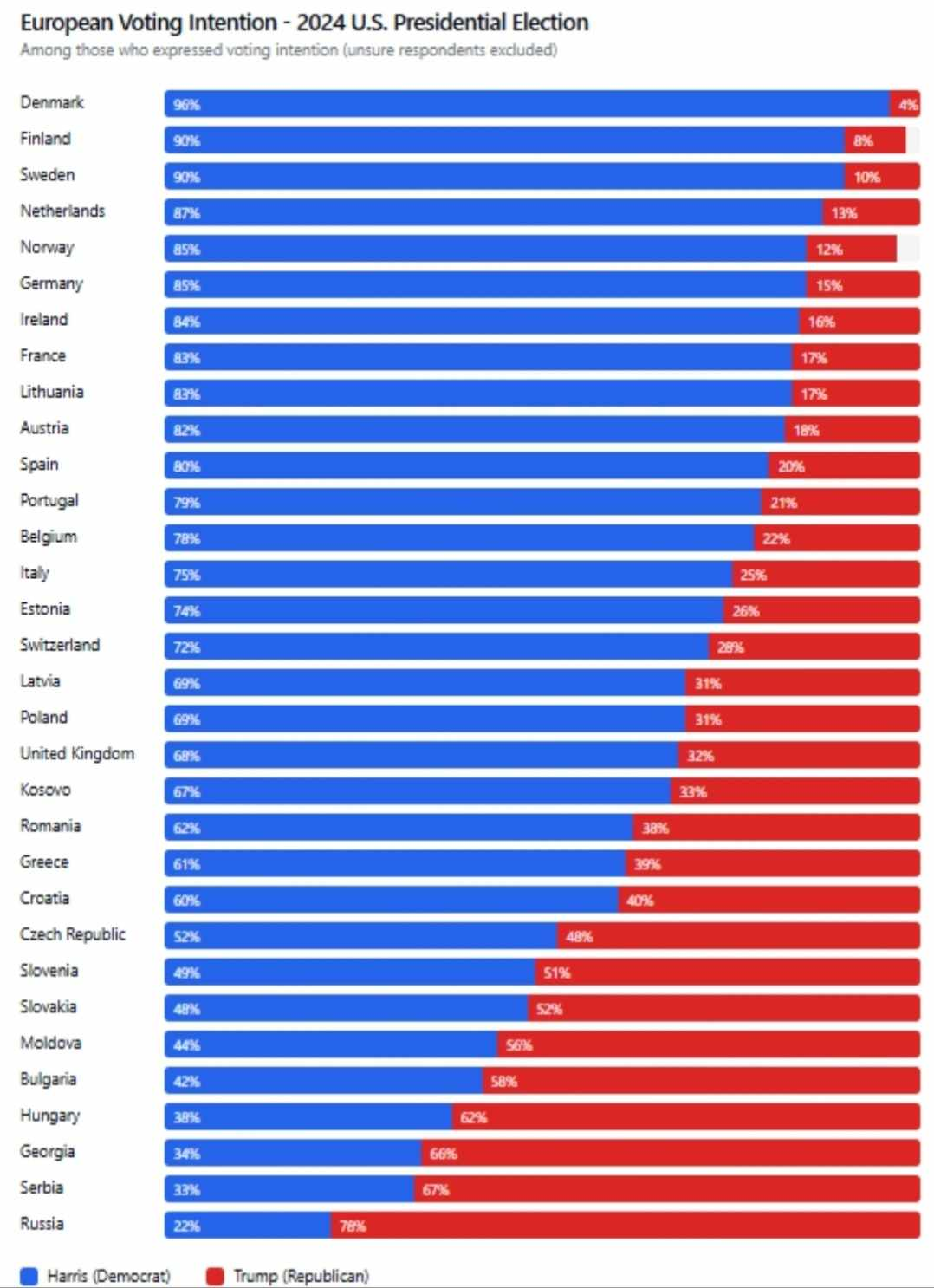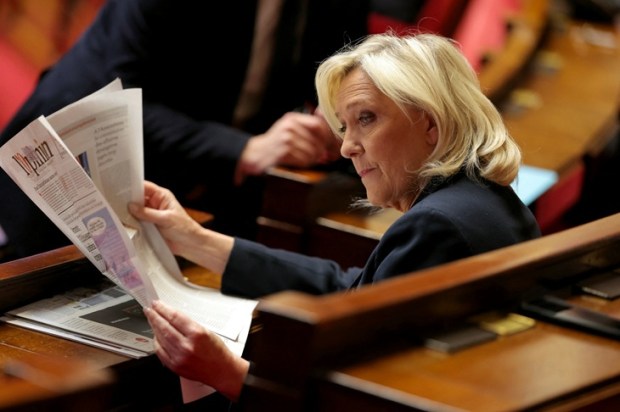In the aftermath of Donald Trump’s convincing win in the American presidential election, a lot of balderdash has been expended on how a resurrected Trump presidency might affect America’s allies, including Western Europe. The scribes of these articles mostly deal with the anticipated restrictive trade policies Trump might want to champion and the impact of his election on the North Atlantic Treaty Organisation (Nato) and its involvement in the ongoing military conflict between Russia and Ukraine.
But the commentary on the election result has thus far failed to address a critical issue that, at least potentially, is more important than the fleeting and transient politics of trade and geopolitics. This issue is the steady decline of traditional values and the support for the basic principles which are necessary for the survival and prosperity of Western Europe’s social contract, post the second world war. Specifically, the election has dramatically laid bare the moral emptiness of the European continent that once, not too far in the past, was an architect and champion trailblazer of freedom. Hence, it is appropriate to argue that the election result gives us an unadulterated insight into the depth of depravity, Wokeism, relativism, hedonism, materialism, and bureaucratic elitism which the civilised world has embraced.
Prior to the American presidential election, held on November 5, Gallup, an opinion polling company, attempted to ascertain what percentage of European voters would have voted for Trump or Harris. Astonishingly, but predictably, an overwhelming majority of voters (up to 96 per cent in Denmark, 85 per cent in Germany, 83 per cent in France, and 68 per cent in the United Kingdom) registered their preference for Harris over Trump. We also know, from personal experience, that even ‘conservative’ leaning friends in Europe would have welcomed a Harris presidency.
The only member of the European Union where most people preferred Trump is Hungary (62 per cent). The polls also reveal that, as we move into the Eastern European countries, an increasing majority of voters would have welcomed a Trump victory. In Russia, for example, 78 per cent of voters wanted him to be successful. As can be seen from the graph below, the blue band (representing states where people wanted a Harris presidency) clearly dominates Western Europe, whereas the red band gradually increases as we move eastward.
The graph is most instructive because it reveals that the erstwhile Eastern bloc countries favoured a Trump presidency. It graphically depicts a map of Europe where blue is the dominant colour in Western European countries (representing support for Harris) and red the principal colour in Eastern European countries (indicating support for Trump). What do these survey results tell us about the state of Western Europe?

Chart: Europe Elects – Source: Gallup, Verian, Iro Research, Sotomo, Ipsos. Created with Datawrapper
The pattern is clearly visible with respondents in Western Europe and Scandinavia preferring Harris comfortably, while the opposite is true in Eastern Europe. Indeed, most of Western Europeans and especially Scandinavians would vote for the candidate of the Democratic Party with wide margins. At the other end of the scale are former communist countries like Russia (78 per cent), Serbia (67 per cent), Georgia (66 per cent), and Hungary (62 per cent) who would assertively vote for the candidate of the Republican Party if offered a chance.
Of course, these results are just predictions peddled by the omnipresent pollsters, who, times and again, have proven to produce interesting, but ultimately preposterous waffle that amounts to not much more than fiction. One really wonders whether these popular polls are merely political tools to sensitise the population and to push the electorate to vote for the pollsters’ favourite candidate. The American pre-election surveys make it appear that Harris was invincible and enjoyed moral superiority over Trump, a ‘convicted felon’ (a description which may have propelled him towards the presidency). In any event, the popular pre-election polls were consistently wrong.
But, as it stands, the survey results paint a picture of a Western European civilisation in terminal decline. If the polls are believable, even the ‘far right’ voters wanted a Harris victory – a stupendous result because it completely contradicts the presumed conservative policies of these parties. Of course, any well-meaning person would object to this inane description of conservatives as ‘right wing’ or ‘far right’ demagogues. Rather than objectively discussing their arguments, it is always easier to label people and to brutally dismiss their views with ad hominem vitriol that characterises conservative viewpoints as bigoted expressions of ignorance and inhumanity – a strategy so effectively used by the legacy media and left-wing agitators. But as Trump is preparing his transition team, his ascendancy threatens the liberal elites.
Importantly, these opinion polls reveal the cultural changes in Western Europe, including moral relativism, rampant promiscuity, and support for abortion on demand. This is also a result of widespread brainwashing by the ‘mainstream media’ controlled by Western oligarchs. The ruling classes of Western Europe have a notorious and profound disregard for traditional values and beliefs, especially those that brought about the rule of law, liberal democracy, and the protection of individual rights. Instead, these authoritarian oligarchs have imposed on the unwary population a deep cultural pessimism, a sense of complete alienation, and hopelessness. In this way, the vast majority of Western Europeans now generally see their countries as oppressive, evil, and unworthy of any love and loyalty. The ‘mainstream media’ actively contributes to the malaise by engaging in a jihad against traditional Christian values.
Western Europeans have thus decided that they can abandon their Christian heritage without consequence. The traditional values of Western Europe are basically extinct, and a new culture is aggressively promoted. However, the new hedonism that emerges from this process seems unable to give the general population any compelling reason to promote, and respect, a ‘culture of life’. Indeed, the decline in traditional values and beliefs is the main cause of low birth rates, hopelessness, and Wokeism among the native population. The culture that produced Western Civilisation, as traditionally understood, is in its death throes and the new ‘culture of death’ has become the dominant culture of Western Europe.
Douglas Murray, in his bestseller The Strange Death of Europe provides a personal account of a subcontinent caught in the act of suicide. Western Europe, he argues, is basically committing suicide, or at least its leaders have decided to commit suicide. This book is a dramatic account of post-Christian Europeans who no longer believe in anything and are increasingly devoid of a sense of where they came from, where they are going, or why. Murray explores a Western Europe defined by its condition of collective masochism and empty hedonism, where a population constantly feels the need to apologise for its past, failing to accept that other places have also done dreadful things in the past.
In his book, Murray also describes and analyses the effects of the inexorable increase in primarily Muslim immigrants from Africa, the Middle East, and countries such as Pakistan and Afghanistan, particularly since 2015. His book provides a sober analysis of demographics and political realities, but also an account of a civilisation in self-destructive mode. Consequently, throughout Western Europe no one is being allowed to express the slightest criticism of the customs of immigrant populations. Sceptics and critics of this cultural suicide are invariably accused of being ‘racist’ and ‘Islamophobic’. They are likely to be discharged from their jobs and even sent to prison for their ‘crimes of opinion’.
Immigrants to Western European countries, then, cannot be charged with any wrongdoing, even if they commit crimes of terrorism, rape, or murder. Murray notes the remarkable case of a young woman raped by a newly arrived migrant who lamented his imprisonment because it would undermine the effort to welcome refugees. He then gives the example of the 10-year delay in jail for Muslim gangs in the United Kingdom who raped and tortured native English teenagers. He also notes the terrible role of the political and cultural left in promoting group-think that closes minds and suppresses freedom of expression.
The Strange Death of Europe is a fascinating and timely book. This, however, is a book solely about Western Europe, not Eastern Europe. Eastern European countries, previously under Soviet rule and influence, are now highly conservative and proudly assert their Christian heritage and national identity. Hungary, Slovakia, Poland, and Russia, among others, have boldly defied the dictates of the Western ruling classes. The emergence of a half-century experience of communist rule and its historical encounters with Islam made these Eastern Europeans far much more resilient and confident than Western Europeans in their Christian and conservative identities, consisting in the development of more prosperous and healthy societies.
The Trump resurrection, however, has proven the enduring power of ideas and persistence in the face of seemingly insurmountable impediments in rebuilding a traumatised society. It is an invitation to participate in the cultural fights of our lifetime.
Gabriël A. Moens AM is an emeritus professor of law at the University of Queensland and served as pro vice-chancellor and dean at Murdoch University.
Augusto Zimmermann is professor and head of law at Sheridan Institute of Higher Education and served as associate dean at Murdoch University. He is also a former commissioner with the Law Reform Commission of Western Australia.
Zimmermann & Moens are the authors of The Unlucky Country (Locke Press, 2024).

























